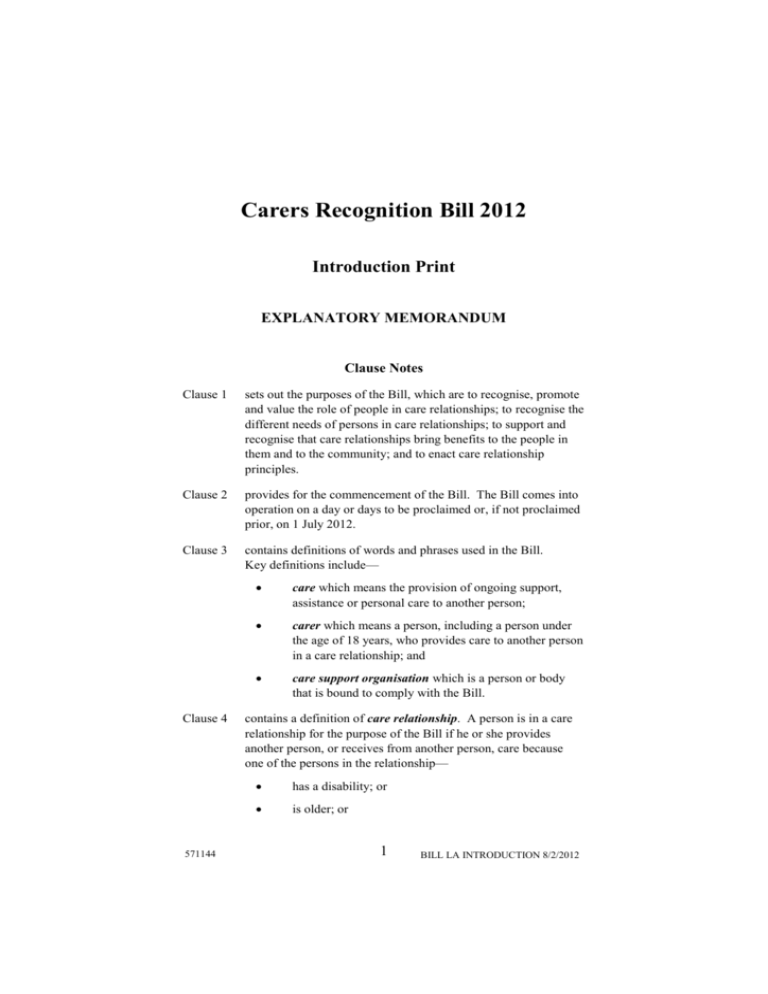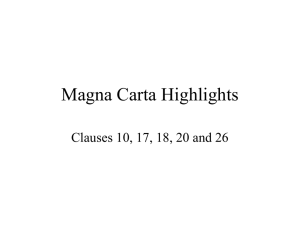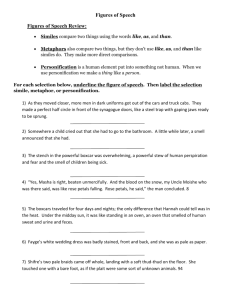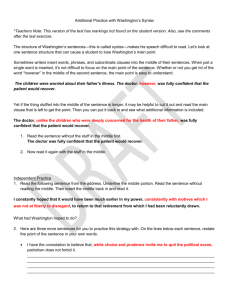Carers Recognition Bill 2012
advertisement

Carers Recognition Bill 2012 Introduction Print EXPLANATORY MEMORANDUM Clause Notes Clause 1 sets out the purposes of the Bill, which are to recognise, promote and value the role of people in care relationships; to recognise the different needs of persons in care relationships; to support and recognise that care relationships bring benefits to the people in them and to the community; and to enact care relationship principles. Clause 2 provides for the commencement of the Bill. The Bill comes into operation on a day or days to be proclaimed or, if not proclaimed prior, on 1 July 2012. Clause 3 contains definitions of words and phrases used in the Bill. Key definitions include— Clause 4 571144 care which means the provision of ongoing support, assistance or personal care to another person; carer which means a person, including a person under the age of 18 years, who provides care to another person in a care relationship; and care support organisation which is a person or body that is bound to comply with the Bill. contains a definition of care relationship. A person is in a care relationship for the purpose of the Bill if he or she provides another person, or receives from another person, care because one of the persons in the relationship— has a disability; or is older; or 1 BILL LA INTRODUCTION 8/2/2012 has a mental illness; or has an ongoing medical condition. The following relationships are also care relationships for the purposes of the Bill— where an individual has custody and guardianship of a child under a permanent care order made under Part 4.10 of the Children Youth and Families Act 2005; where a child is placed with an individual who provides care under a child care agreement made under Part 3.5 of the Children Youth and Families Act 2005; or where a child is placed with an individual who provides care to that child under a protection order made under Part 4.9 of the Children Youth and Families Act 2005. A person described above will be in a care relationship even if the person receives government funding in relation to carrying out the role of carer. However, a person is not in a care relationship with another person if the person is the spouse or domestic partner of the other person, is the parent, child or other relative of the other person or lives with the other person unless the person also meets the above criteria. Additionally, a person is not in a care relationship if the person provides care to another person— under a contract of service or a contract for the provision of the services; under an employment contract; in the course of doing voluntary work for a community organisation; or as part of the requirements of an education course or training. 2 Clause 5 clarifies which organisations are required to comply with the Bill. The Bill will only apply to care support organisations which are— public service care agencies (these are public service bodies within the meaning of the Public Administration Act 2004, a council within the meaning of the Local Government Act 1989 or an entity established by or under an Act for a public purpose, that is responsible for the development, implementation, provision or evaluation of policies, programs or services that affect carers and the person for whom they care); funded care agencies (these are persons or bodies that are funded by a public service care agency and have responsibility for programs or services that directly impact on carers and the persons for whom they care); subcontractors of funded care agencies, but only with respect to the provision of programs or services that directly impact on carers and the persons for whom they care; and any person, body or class of person prescribed by the regulations. However, the Bill will not apply to family day care services, children's services, education and care services, preschool programs or Government and non-Government schools. Clause 6 provides that if there is an inconsistency between this Bill and any other Act, the other Act will prevail. Clause 7 sets out the principles relating to carers. Clause 8 sets out the principles relating to persons being cared for. Clause 9 sets out the principles relating to care relationships and relate to both the carer and the person being cared for. Clause 10 provides that the care relationship principles set out in clauses 7, 8 and 9 do not create or confer on any person any right or entitlement enforceable at law. 3 Clause 11 sets out the obligations of care support organisations. Under the Bill, a care support organisation must take all practicable measures to— make its employees and agents aware of, and understand the, care relationship principles; ensure that persons who are in care relationships and who are receiving services from the care relationship agency for the care relationship are aware of, an understand, the care relationship principles; and ensure that the care support organisation and its employees and agents reflect the care relationship principles in developing, providing or evaluating support and assistance for persons in care relationships. However, the above obligations do not create obligations on care support organisations to provide funding or services to persons in care relationships. Clause 12 sets out the obligations of care support organisations with respect to reporting. A care support organisation must include, in its annual report, a report on its compliance with its obligations under clause 11. The report must also include any additional information required by the regulations. Clause 13 provides that the Governor in Council may make regulations for any matter or thing required or permitted by the Bill to be prescribed or which are necessary to give effect to the Bill. Clause 14 sets out amendments to the Disability Act 2006. The amendments are to ensure the role of carers are recognised in the principles of the Disability Act 2006 and are considered in planning for persons with disabilities. Clause 15 provides for the repeal of Part 5 of the Bill on 1 July 2013. This repeal does not affect the continuing operation of the amendments made by this Part (see section 15(1) of the Interpretation of Legislation Act 1984). 4







